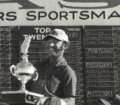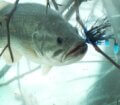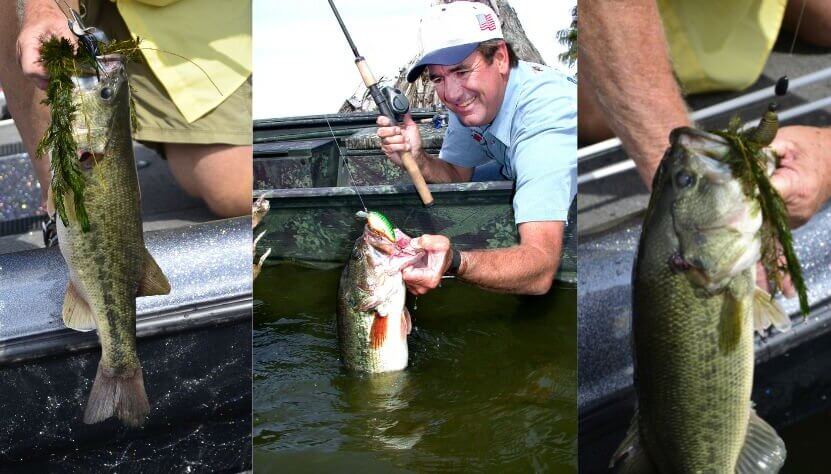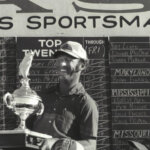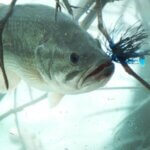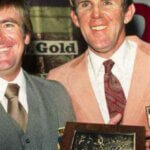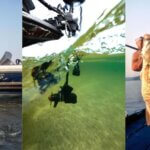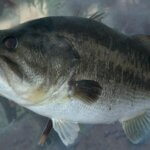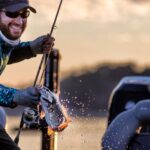Editor’s Note: One of America’s greatest bass fishermen almost vanished from sight when he left competitive bass fishing. However, 72-year-old Larry Nixon from Bee Branch, Arkansas, has come back to Bassmaster. I wanted to know why my longtime friend is returning as well as learn some of his tactics that have made him so successful for 46 years of competitive bassing. Nixon first began tournament bass fishing at the age of 27, while guiding part time. He then joined Bassmaster in 1987. He’s fished 25 Bassmaster Classics, including winning the 1983 Bassmaster Classic and the coveted title of Angler of the Year for two years. He’s won major bass tournaments with Bassmaster, Major League Fishing (MLF) and the FLW circuits for total tournament monies of $3.8 million.
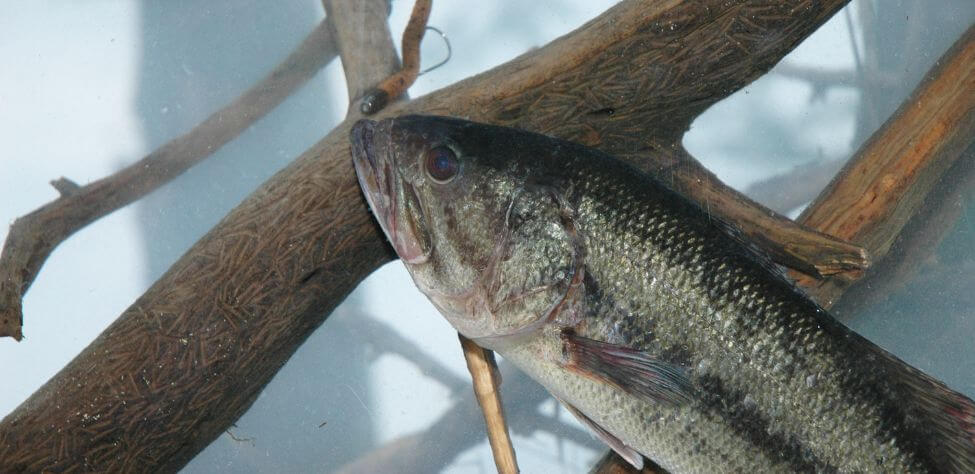
John E. Phillips: What type of spinning rod/reel are you using?
Larry Nixon: I am mostly fishing a Dobyns 704 7-foot spinning rod with a medium-heavy action, and it seems to be just right for all my worming techniques. I don’t like changing rod size when I’m fishing, and that rod seems to do best with the worm techniques I’ve described. I like a Bass Pro Shops Johnny Morris Platinum Signature Spinning Reel JPT3000 with fluorocarbon, 12-pound test, SUNLINE XPS yellow braided line. If I’m making long casts, I’ll use a 7-foot fluorocarbon leader, and if I’m using a drop-shot technique, I’ll fish use a 15- or a 20-foot fluorocarbon leader.
Phillips: Okay, Larry, what baitcasting rod and reel are you using, and why?
Nixon: Although I am a fan of spinning tackle, when the type of cover makes me fish bigger line to catch a bass, I do use my baitcasting rod quite a bit. I’ll be fishing with 12-20 pound test, braided line; a Dobyns 7-foot 705 Champion XP Crankbait Rod; and a Johnny Morris Signature Series baitcast reel or Dobyns 705 Spinning Cast Reel with a 6.8:1 gear ratio.
Phillips: What causes you to lay down your spinning-tackle and pick-up your casting tackle?
Nixon: I always have both types of rods and reels on my casting deck. If I’m fishing a wacky worm, I’ll pick-up the spinning tackle and use it because a wacky-style worm is too light to throw on a baitcasting rod and reel. If I’m trying to skip a bait under docks, I’ll use a spinning tackle, since I can skip that lure better with a spinning rod than a casting rod. Also, I will have light line because on most lakes that we’re fishing, there’s so much fishing pressure that I feel light line gets more bites than a heavy line does. If I’m using an 8- or a 10-pound test leader and think I’m getting more bites with that, I will stay with the lighter line and spinning tackle.
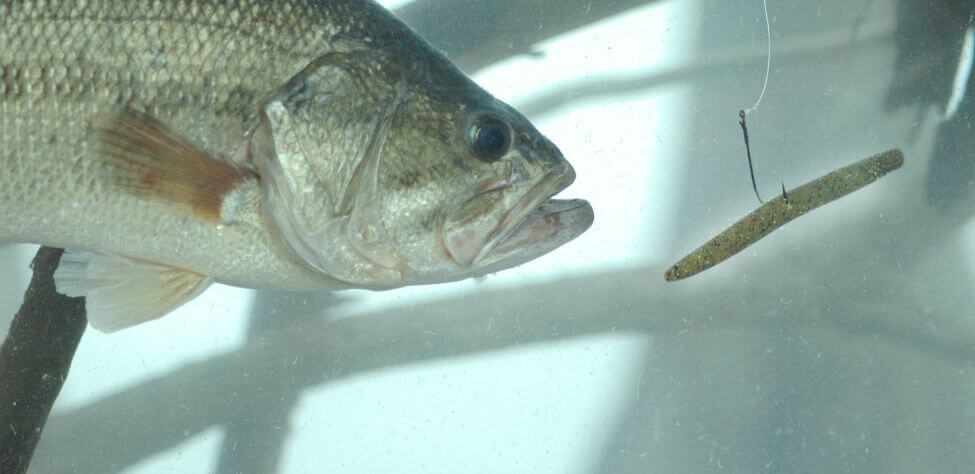
If I’m fishing grass, I’ll peg my slip sinker to the line for a Texas-rigged worm, or I’ll fish a wacky worm with no weight when I need the bait to fall slower once it hits the water. I also can use a weedless worm to spin the bait over the grass. I’ve learned that if I use a shaky-head worm and throw it into the grass, then when it gets tangled, I can pop it up out of the grass and let it fall back – getting more bites than with other tactics. The lure I use in grass depends on if the grass is underwater and thick and/or matted on the surface. If I need my worm to get down through the grass, I’ll use baitcasting tackle with a somewhat heavier lead head. Then the shaky-head worm can drop through the grass and get to where the bass are holding.
Tomorrow: Larry Nixon’s Favorite Bass Lakes
Expert Guidebooks on Bass Fishing: Best Sellers

If you want to become the best you can be, find someone who’s already become the best at what you want to do and follow his or her instructions. This is what I’ve done in my new book, Bass Pros’ Season by Season Tactics.
In this book, I’ve chosen some of the best bass fishermen to give you advice on how to find and catch bass during each period of a bass fish’s life, including professionals like Kevin VanDam, Denny Brauer, David Fritts, Rick Clunn, Larry Nixon, George Cochran, Mark Davis, Woo Daves, Gary Klein, Davy Hite, Michael Iaconelli, Skeet Reese, Mark Rose, and Shaw Grigsby.
My hope is that this book will help you find and catch more bass at every time of the year and each day you’re on the water. The men included in this book are some of the best mentors I know of for successful bass fishing anywhere in the nation.
VERSIONS: AUDIBLE & PRINT
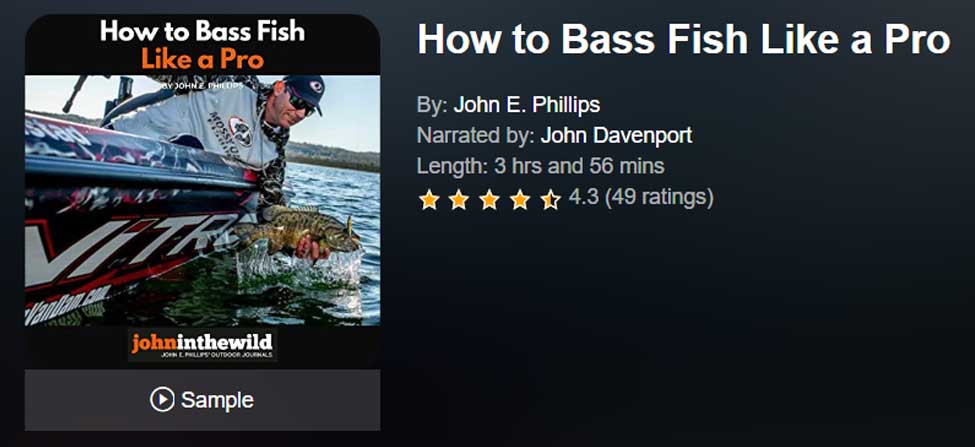
How to Bass Fish Like a Pro
If you could sit down and interview some of the best pro bass fishermen in the world, what would you want them to tell you to help you improve your bass fishing skills?
In this book, How to Bass Fish Like a Pro, Kevin VanDam explains how he catches bass consistently, and how he fishes all 12 months of the year. In the bonus chapters, he will tell you how to fish for hot-weather bass.
Denny Brauer will tell you the ways he hates to fish, how he picks the best fishing lures for different water and weather conditions, and will give you his best fishing tips for hot weather. In Brauer’s bonus chapters, he’ll teach you when to flip a jig, a tube, or a creature bait and tell you his three tips for how to be a better fisherman.
Mark Davis, in Chapter 3 of the book, explains his five secrets to becoming a better bass fisherman, how to turn your bass fishing around to the positive side, and how to catch hot-weather bass. In the bonus chapter, you’ll get six different interviews with Davis, where he tells you: three tips for becoming a better bass fisherman; his three favorite bass lures; and how to keep a big bass on the line and get it to the boat.
James Niggemeyer tells you how to become a bass pro. He also tells you how to catch bass when the weather sizzles. In Niggemeyer’s bonus chapter, he explains how to move from being a bass-club fisherman up to being a pro.
Mark Rose will explain his five favorite go-to bass lures, and how to catch bass in the middle of the summer.
In this book, you’ll hear from top-performing pro fishermen about how they catch big bass consistently, and what they do to win millions of dollars as professional bass fishermen.
VERSIONS: AUDIBLE, KINDLE & PRINT
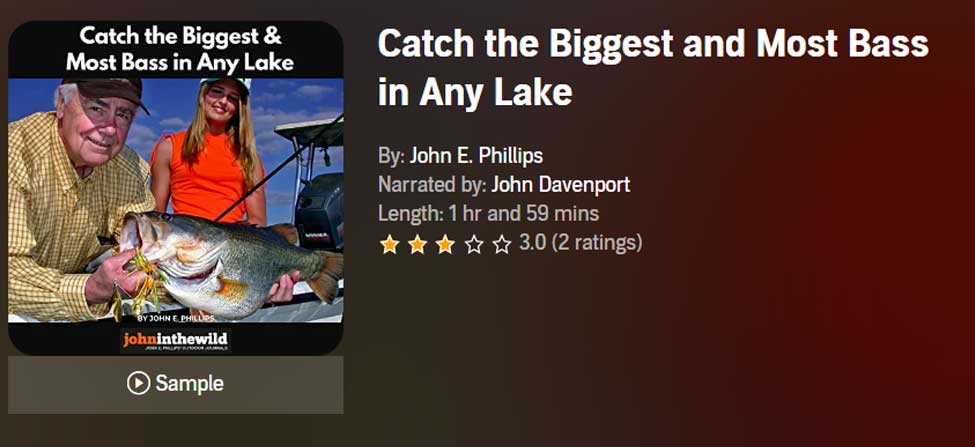
Catch the Biggest and Most Bass in Any Lake
If you were having open-heart surgery at the hospital, you’d want the best doctor with the most experience and the latest equipment and techniques that money could buy to do your operation. You’d study these doctors’ credentials to learn who was the best.
This is the same type of research that author John E. Phillips has done with the best bass fishermen in the nation to solve the problem of how to find and catch the biggest and the most bass in any body of water that he fishes.
This is the same type of research that author John E. Phillips has done with the best bass fishermen in the nation to solve the problem of how to find and catch the biggest and the most bass in any body of water that he fishes.
In this book, you’ll hear about the techniques, tips, baits, lures, and tackle that 18 of the nation’s best professional fishermen use to support their families by winning bass tournaments and catching the most and the biggest bass they can in every tournament they fish.
Most of these anglers are Bassmaster Classic winners, Megabucks winners, Angler-of-the-Year and FLW Tour winners – like Rick Clunn, Kevin VanDam, George Cochran, Mark Davis, Paul Elias, Skeet Reese, Larry Nixon, Hank Parker, Ken Cook, Denny Brauer, Alton Jones, and Jay Yelas.
Also, every serious bass fisherman should know Timmy Horton, Mark Rose, Randy Dearman, Harold Allen, Mike Wurm, and Shaw Grigsby, men whose tactics you’ll find in this book. To learn how to fish for bass and change your bass-fishing trips from fishing trips to catching trips, this book is a must-have.
VERSIONS: AUDIBLE, KINDLE & PRINT
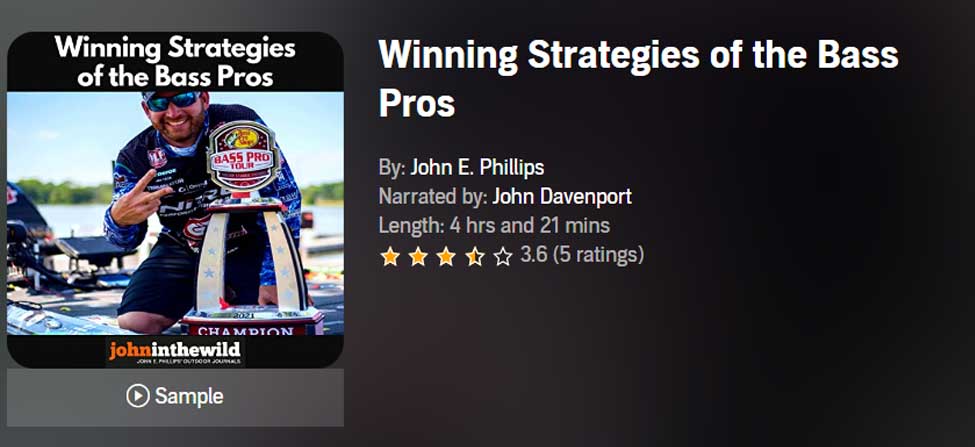
Winning Strategies of the Bass Pros
I learned many years ago if you want to be the best you can be, then you need to learn from the best – particularly when you want to be the best bass fisherman possible. That’s why I’ve written Winning Strategies of the Bass Pros about 11 top bassers.
If you’re wondering at what age you can start learning about bass fishing, you’ll see in the first two chapters about two young men who have come up through the ranks of collegiate bass tournaments – Jordan Lee, who won the Bassmaster Classic in 2017, and Dustin Connell, who won $100,000 in a B.A.S.S. Elite Series tournament in Mississippi in 2017. Top-name pros on both the B.A.S.S. circuit and the FLW circuit are in this book, including Kevin VanDam, Jay Yelas, George Cochran, Rick Clunn, Larry Nixon, Woo Daves, Randy Howell, Scott Canterbury, and Gary Klein.
VERSIONS: AUDIBLE, KINDLE & PRINT
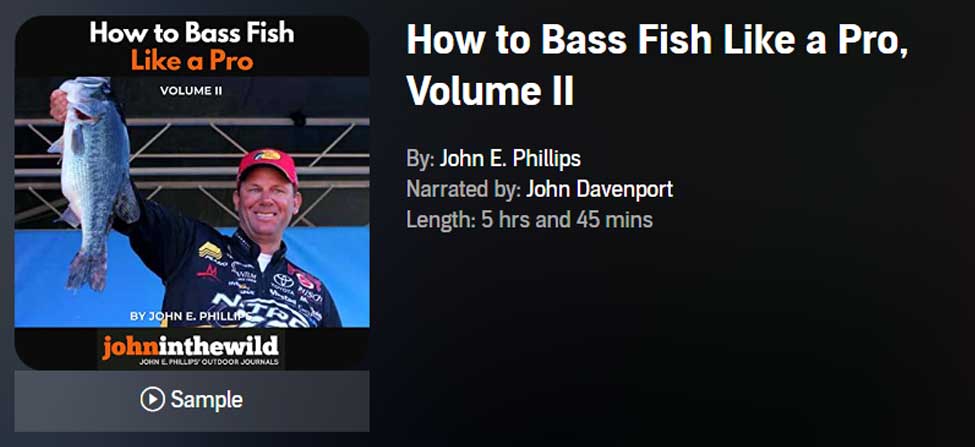
In How to Bass Fish Like a Pro, Volume II, you’ll learn tips and tactics from 21+ Bassmaster Classic winners, two Major League Fishing champions, and 20+ Bassmaster Anglers of the Year about some of the dramatic changes in bass fishing, like:
Depth Finders: You need the latest and greatest depth finders available, since they’re the brains of a bass boat with maps, GPS, side scanning, down scanning, and forward scanning features that enable you to see underwater structures and fish 100-feet away with a 360-degree view. Today’s competitive bass anglers may have four or five depth finders located on the consoles and the bows of their boats.
Other Changes in Equipment: Power fishing for bass using heavy line and rods, big baits, and bait-casting reels that resemble winches have given way to finesse fishing and new techniques like fishing the Ned Rig, the Neko Rig, the Chicken Rig, and the Tokyo Rig on spinning tackle and line as small as 6-10 pounds.
The Growth in Youth and College Competitions for Bass: A young person can begin competition fishing as early as the second grade and continue throughout high school. After that, if the competitor qualifies, he/she may win a scholarship to fish on a college team that eventually may lead them to a professional bass-fishing career.
Changes in the Ways Anglers Bass Fish: Many of the most-consistent winners never pick-up their rods to fish during pre-fishing. Instead, they’ll idle across the water, dropping waypoints from their electronics in places where they’ve identified schools of bass holding. These contestants will have at least 50-250 locations, where they’ve pinpointed schools of bass before a tournament starts.
VERSIONS: AUDIBLE, KINDLE & PRINT

